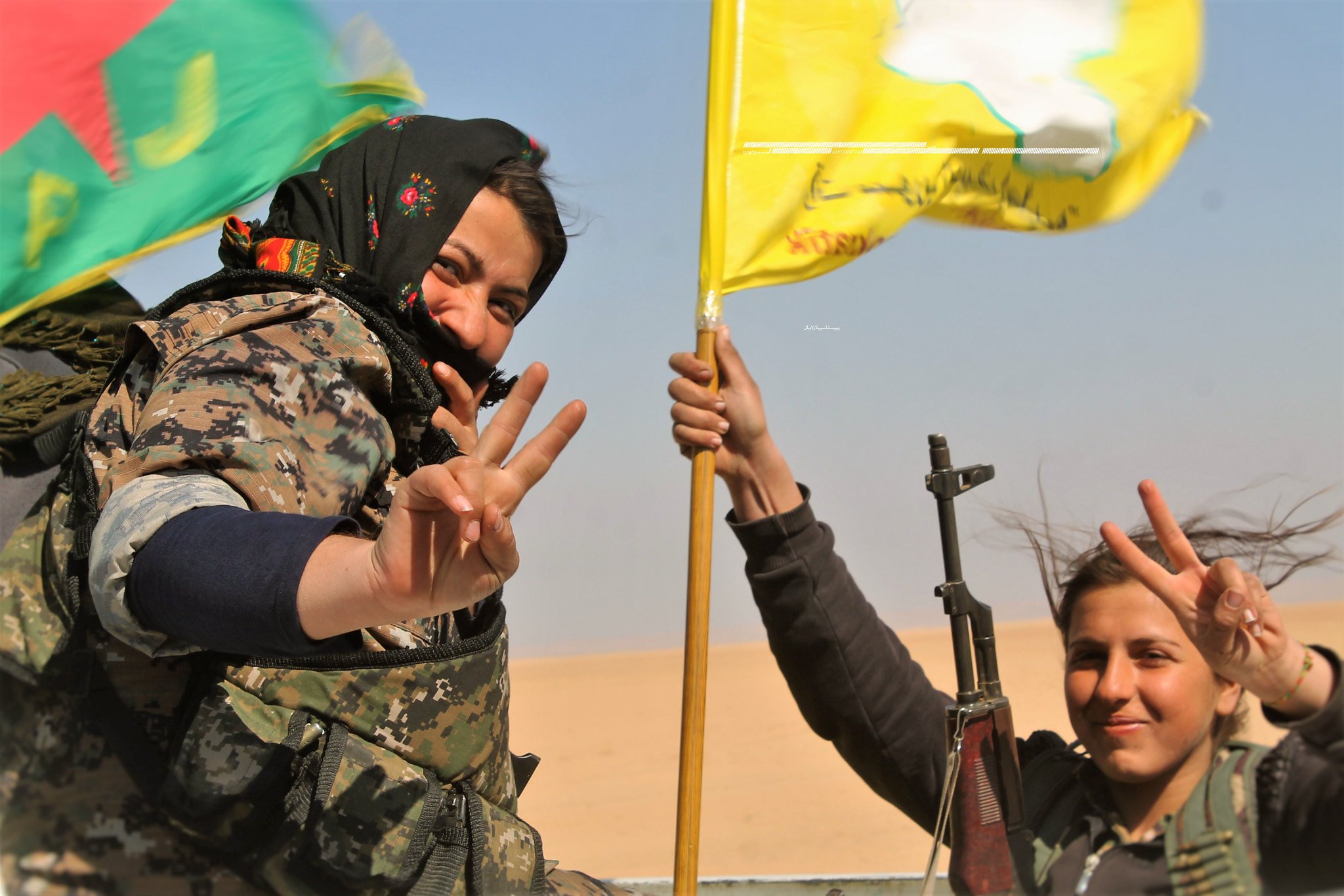Saving the YPJ, saved by the YPJ: Kurdish women’s feminism, agency and intervention in Syria
By: Eda Gunaydin (she/her/hers)
Feminist international relations scholars have long demonstrated that Western foreign policy discourses often emphasise the need to intervene in areas of the global south in the name of women’s rights. This phenomenon is captured by Gayatri Spivak’s well-known statement that ‘white men are saving brown women from brown men.’ This article draws on the long history of these foreign policy discourses, finding that representations of women likewise legitimized Western involvement in Syria. I focus on the case study of the People’s Protection Units (or YPJ), a majority-Kurdish female fighting force, and study representations produced by Western media about the group.
Kurdish YPG fighters. © Kurdishstruggle on Flickr
The YPJ drew a lot of attention in the Western media landscape in 2014 after the militia held the city of Kobane against ISIS’ deathly assaults for six months unassisted. The world reeled from images of male and female fighters using decades-old Kalashnikovs and even blowing themselves up to maximize ISIS casualties. By October, the Twitter hashtags #ObamaHearKobani and #SaveKobani trended, and Secretary of State John Kerry announced it was the United States’ moral duty to assist the Kurds. In August of 2014, President Obama authorized strikes against ISIS in Syria, and worked to form an international coalition alongside several nation-states (Operation Inherent Resolve). This coalition comprised the US, France, Belgium, Canada, the United Kingdom, Netherlands and Australia.
My key argument in this article is that studying the representations produced about the YPJ in Western media (newspaper articles and documentaries) in this period reveal something both typical and atypical about the Western narratives that often prolong Middle Eastern wars. Although gendered and orientalist narratives about the YPJ are rife, depicting them in highly exoticised ways, I also find that rather than being depicted typically as passive, silent victims who require liberation, YPJ fighters are often depicted instead as liberators themselves, for example as powerful ‘badasses’. In some ways, this inverts the trope about ‘white men saving brown women from brown men.’ Although this might appear like a positive development, Western representations of YPJ fighters are still limited. Despite the agency they ascribe to YPJ fighters, they also withhold it.
I make this argument by contrasting the Western discourse on the YPJ with original translations of YPJ members’ statements about their identity in their own words (in published political texts on the Kurdish women’s liberation movement known as jineology, and in interviews), and show that Kurdish female militants propose radically alternative, non- and anti-Western accounts of their politics. As I demonstrate in the paper, jineology is an autochthonous women’s liberation ideology. Jineology advocates a rejection of multiple, intersecting forms of hegemony, not only patriarchy. Jineology also identifies other forms of hegemonic power, including the nation-state and capitalism, as contributors to women’s oppression. Therefore, the Kurdish women’s liberation movement has directed its struggle simultaneously against both nationalist oppression and gender oppression.
This makes sense when considering that Kurdish women have been oppressed by both patriarchy and the Syrian state. To that end, jineology espouses an awareness that nation-statism has been fundamentally imbricated with patriarchy, and that the nation-state reproduces patriarchy because the nation-state is intrinsically hegemonic and masculinist. Jineologists therefore use the formulation ‘statism-sexism-powerism’ to capture the indivisibility of these hegemonies. Jineology therefore offers explicit critiques of Western forms of feminism such as liberal feminism for its failure to observe that all forms of power, including the power of states, are imbricated with one another, and therefore that national oppression feeds gendered oppression. In addition to a rejection of statism, jineology also proposes explicit anti-capitalist politics, and critiques how Kurdish women fighters are depicted and commodified in Western media. As a fighter said in 2015: “ISIS is certainly a terrible group, and their ideology is dangerous especially for women. But our fight is about much more than that.” If we listen to these self-representations, I argue, we can uncover an even more potent vision of Kurdish female militancy and agency.
Read the full article here: Saving the YPJ, saved by the YPJ: Kurdish women’s feminism, agency and intervention in Syria
Each blog post gives the views of the individual author(s) based on their published IFJP article. All posts published on ifjpglobal.org remain the intellectual property and copyright of the author or authors.
Eda Gunaydin is a graduate student in the Department of Government and International Relations at the University of Sydney. Her key research interests are in the areas of gender, race and violence in international relations. In 2016 she received the University Medal in Government and International Relations, and she has been a research assistant in the Department since 2015.


